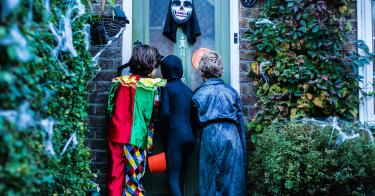Halloween is the spookiest night of the year, when millions of monsters and supernatural creatures of the night (often accompanied by their parents) stalk peaceful communities and extort candy from good people under threats of mischief.
These rambunctious ghouls and goblins are only looking for fun, sweets, and a bit of playful fright. But there is something that should terrify trick-or-treaters (and their parents) more than haunting ghosts, blood-thirsty vampires, prowling werewolves, or even a jack-o’-lantern in space: sinister city council members trying to hand out criminal convictions like candy.
The City Council of Chesapeake, Virginia, has outlawed any child over the age of 14 from trick-or-treating under penalty of a misdemeanor conviction and fines up to $250. The council also mandated that trick-or-treating end sharply at 8 p.m.
Last year, before the council revised the law, children 12 or older were forbidden to trick or treat under penalty of up to six months imprisonment.
Frighteningly, Chesapeake’s ordinance is one of the least restrictive among cities in the Hampton Roads region of Virginia. In addition to halting door-to-door fun at 8 p.m., Hampton, Newport News, Norfolk, Portsmouth, Suffolk, Virginia Beach, Williamsburg, and others criminalize trick-or-treating beyond the age of 12.
Moreover, the criminalization of a tradition for children doesn’t end at Virginia’s state border. Cities in Illinois and Mississippi also prohibit anyone over the age of 12 from participating in trick-or-treating activities.
Chesapeake and other cities such as Belleville, Illinois, have attempted to defend their ordinances by claiming that they never before have been enforced, but, according to Chesapeake’s website, “give police an option, should things get out of hand on Halloween.”
Chesapeake officials also point to an earlier occurrence, in the 1960s where things did get “out of hand” because of some rowdy teenagers with fireworks.
In defense of his city’s ordinance, Belleville Mayor Mark Eckert claims that it addresses fears held by “young single moms” and senior citizens of “big kids” in high school who have the ability to act aggressively toward homes and homeowners.
Nevertheless, the possibility of some older children acting mischievously or even belligerently is no reason to criminalize the innocent behavior of thousands of others.
Most kids simply want to collect candy and spend a festive evening with friends and families, and other laws already prohibit breaking and entering, vandalism, or assault for those who do get “out of hand.”
Creating new laws to punish otherwise blameless behavior serves no legitimate government interest and contributes to the growing problem of overcriminalization—the overuse and abuse of the criminal law to address every societal problem and punish every mistake.
Heritage Foundation scholars have written extensively (see here, here, and here) about overcriminalization, and, unfortunately, not even holidays like Halloween are beyond its tentacles.
Laws that never have been enforced should not be kept around as potential safeguards against potentially bad behavior.
Instead of feeding the wild beast of overcriminalization, as communities reflect on their Halloween and kids recover from their sugar highs, cities with ridiculous bans on trick-or-treating should rethink their priorities and help combat the rampant spread of the misuse of criminal law.
This piece originally appeared in The Daily Signal



